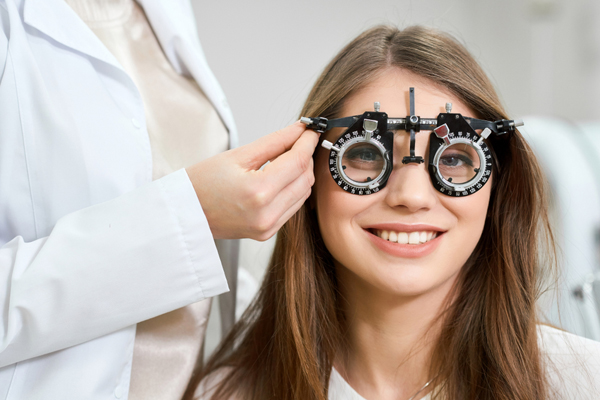Shortsightedness – Optometrist Treatment Options for Myopia

Myopia is a common condition that can affect people of all ages. If you are struggling with this issue, it can complicate your everyday life. Fortunately, there are ways to treat it. Your optometrist can examine you and diagnose you properly. Then, you can discuss the right approach to treat your vision problems. You do not have to live with these challenges any longer, and you can enjoy the quality of life you want.
An explanation of myopia
Optometrists diagnose and treat a number of eye and vision conditions. Shortsightedness is one of the most common. People who have this have a difficult time seeing far-off objects but can see well up close. It occurs when a person’s eyeball is too long or the cornea is too curved. This prevents the eye from focusing correctly and causes blurry vision. Some with shortsightedness, or nearsightedness, may have headaches or eyestrain.
The diagnosis
An optometrist has the knowledge and training to examine patients who think they may have myopia. The doctor will check the person’s vision with an eye test. Next, the doctor will look at the structure of the eye to determine whether there are abnormalities. The optometrist may also ask the patient about their symptoms and how long the issues have been present.
An eye doctor will use a phoropter. This device helps the doctor see how the patient’s eyes focus on the light that enters them. The retinoscope will shine a light. The phoropter will find out what the focusing power is. Responding to the focus level will determine which lenses can fit the patient well.
The doctor may use eye drops if the patient’s focusing power is hidden or if the patient cannot respond verbally. These drops prevent the eyes from having an unstable focus during the testing period. The different tests can help the eye doctor see if the patient has myopia. The results will also determine the lens power the patient needs for clearer vision. Discussing the treatment options will come next.
Glasses or contacts
To treat myopia, the optometrist may first discuss that the patient wears corrective lenses. These could be in eyeglasses or contacts. The optometrist will determine the correct prescription. It will be a negative number such as -2.5 or -2.0. Corrective lenses will help effectively focus the light on the patient’s retina. This will make faraway objects clearer.
LASIK surgery
The optometrist may also recommend surgery to correct myopia. The most common is LASIK surgery. In this procedure, a surgeon will use a laser to make a flap on the cornea. The surgeon will also sculpt the cornea and then put the flap back in the correct place.
LASIK is not an option for all patients. So, the optometrist will help make the right decision. It is an effective process that results in little pain or discomfort. The patient will not have to get stitches following the procedure.
PRK
Photorefractive keratectomy is another option for helping with myopia. It also uses a laser to sculpt the cornea, the middle layer in this case. It allows light to focus closer to the retina by making the cornea flatter. This is an outpatient surgery and only takes about 10 minutes to perform. The surgeon will first numb the eye before starting. The person may feel some eye pain for the next day or two after the procedure.
CRT or ortho-K
Treating nearsightedness is also possible with ortho-K or CRT (corneal refractive therapy). This non-surgical treatment will involve wearing rigid contact lenses to correct the shape of the cornea. The lenses press onto the cornea to help flatten it. This changes the way the eye focuses light as it enters. The eye doctor will tell the patient to wear the lenses overnight and then remove them the following morning. Those with mild myopia may have short-term clear vision during the day.
Refractive surgery
In some cases, the eye doctor will need to perform surgical correction for myopia. Implanting small lenses in the cornea can correct myopia. These lenses will have the necessary corrective focus power. The implant can replace the natural lens or can stay in front of the natural lens. This procedure is much like cataract surgery.
Get your vision back where you need it
Dealing with myopia can be a challenging problem. It makes reading difficult, not to mention seeing road signs and other everyday items. You may even experience physical problems. If you are tired of living with these issues, talk to your optometrist today to get help. Make an appointment for an examination so you can find the right solutions to this condition.
Get more information about Bright Eyes Optometry in Mt Vernon at https://brighteyesmv.com.
Check out what others are saying about our services on Yelp: Myopia in Mt Vernon, NY.
Recent Posts
Emergency eye care is needed if you find yourself dealing with a problem with your eye that causes pain or affects your vision. Failing to treat eye injuries as soon as they are detected can lead to permanent consequences, like reduced vision or blindness. Common eye injuries that require emergency eye care include: Exposure to…
Looking for more information on eye protection? An ophthalmologist knows everything there is to know about protecting the eyes. While there are a few different types of eye care professionals, ophthalmologists are eye care professionals who have undergone additional years of education and training so they can offer their patients both medical and surgical eye…
Controlling myopia at an early age can slow down its progression. This can help prevent yearly upgrades for stronger glasses. Your optometrist can help by offering various treatments. If you want to find out how your optometrist can help control myopia, here are the details.Optometrists use atropine eye drops to achieve short-term myopia control results.…
Another word for an itchy eye is ocular pruritis. It is a common health situation in many people. Itchiness in your eyes is more than enough reason to see an optometrist. Receiving prompt treatment is important in receiving prompt relief. If you want to know what causes an itchy eye and the treatments for it,…



